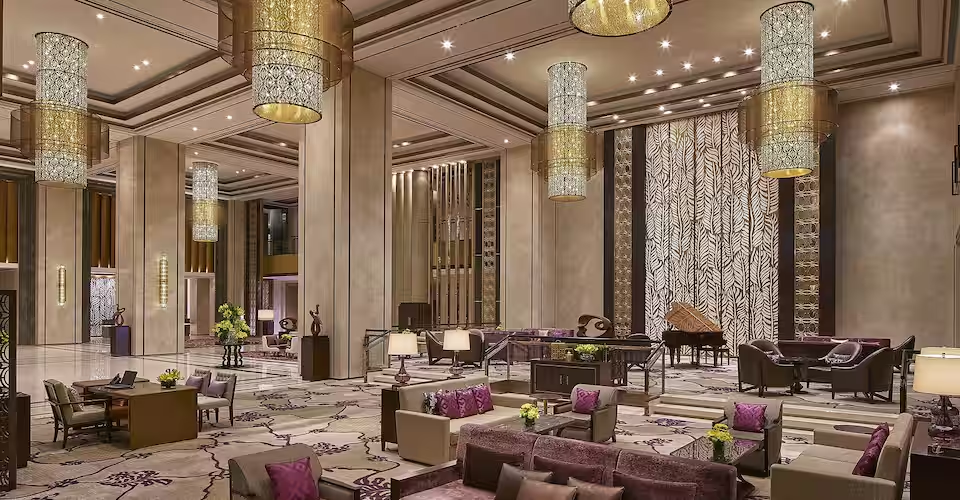The hotel lobby lounge is more than just a waiting area. It is a space where guests can relax, enjoy fine food and drinks, socialize, or simply take a moment for themselves. Unlike ordinary lobbies, a hotel lobby lounge is designed to combine elegance, comfort, and functionality. Whether you are visiting for business or leisure, it creates a welcoming environment that enhances the overall hotel experience.
The Heart of the Hotel
The lobby lounge serves as the heart of a hotel. It is often the first place guests notice, setting the tone for their stay. A well-designed lobby lounge reflects the personality and style of the hotel. It is more than just a transitional space between the entrance and rooms; it is a destination in itself. Guests can sit in plush seating, enjoy a cup of coffee, or meet someone in a stylish, relaxed environment.
The ambiance of a lobby lounge can make a lasting impression. Many hotels invest heavily in creating spaces that are both visually striking and comforting. The combination of soft lighting, elegant furniture, and carefully chosen decor elements makes the lobby lounge feel luxurious yet welcoming.

Design and Ambiance
A hotel’s lobby lounge is often a showcase of design and interior creativity. Designers focus on creating a space that blends aesthetics with comfort. From grand chandeliers and artistic furniture to modern minimalism or classic elegance, the decor plays a critical role in the guest experience.
Lighting is one of the most important aspects of a lobby lounge. Warm, soft lighting can create a relaxing atmosphere, while natural light streaming through large windows adds a sense of openness and connection to the outdoors. Comfortable seating arrangements, such as sofas, armchairs, and ottomans, encourage guests to linger, read, or converse.

Color schemes and textures are also chosen carefully. Soft, neutral tones often convey sophistication and calmness, while vibrant accents can create energy and liveliness. Many lounges use rugs, cushions, and decorative elements to soften the space and make it feel homely, even in a grand hotel setting.
Culinary Offerings
A defining feature of a hotel lobby lounge is its culinary offerings. Many lounges provide a menu of light bites, pastries, teas, coffee, and cocktails. These offerings are often a reflection of the hotel’s culinary standards. A well-curated menu ensures that guests enjoy not just the ambiance, but also exceptional food and beverages.
Afternoon tea is one of the most iconic experiences in a hotel lobby lounge. Guests can indulge in an assortment of teas, delicate pastries, finger sandwiches, and cakes. The ritual of afternoon tea combines elegance, flavor, and relaxation, creating a memorable experience for travelers seeking a break from their busy schedules.
Cocktails and beverages are another important aspect. Skilled bartenders and mixologists craft drinks that range from classic to innovative, offering guests a unique experience that cannot be found elsewhere. A cocktail hour in a lobby lounge often becomes a social event where travelers can unwind, mingle, or celebrate special occasions.

Social and Cultural Hub
Hotel lobby lounges often act as social and cultural hubs. Beyond dining, they provide spaces for conversation, meetings, and informal gatherings. Many hotels use the lounge to host events such as live music, art exhibitions, or cultural performances. These events create a dynamic environment that appeals to both locals and travelers.
The lounge can also serve as a meeting point for business travelers. It offers a professional yet relaxed environment suitable for informal meetings, networking, or discussions. This combination of business functionality and leisure comfort is a hallmark of a high-quality lobby lounge.
Comfort and Versatility
One of the main reasons guests are drawn to hotel lobby lounges is comfort. The furniture, lighting, and layout are all designed with relaxation in mind. Guests can read, work, or simply enjoy a quiet moment. Unlike crowded restaurants or cafes, the lobby lounge offers privacy and calm, making it an ideal retreat within a busy hotel.
Versatility is another key characteristic. The lobby lounge can accommodate a variety of needs and occasions. Guests might enjoy a quiet breakfast in the morning, an afternoon coffee break, a business meeting, or a casual evening drink. The space seamlessly adapts to different functions, making it essential for modern hospitality.
Signature Experiences
Many hotel lobby lounges are known for signature experiences. This might include live music performances, themed evenings, or unique culinary offerings. Some lounges host traditional ceremonies, like afternoon tea or wine tastings, that add a sense of ritual and elegance to the stay.
These experiences are carefully designed to leave guests with lasting memories. A visit to the lobby lounge is not just a stopover but a chance to engage with the hotel on a deeper level. Guests often find that these moments of leisure and indulgence become highlights of their travel experience.
Global Variations
While the concept of a lobby lounge is universal, the experience varies across the globe. In some cities, lobby lounges emphasize luxury and grandeur with lavish decor, chandeliers, and expansive seating areas. In others, the focus may be on modern minimalism, blending natural materials, light, and simple yet elegant furnishings.
The cultural context often influences the offerings. For example, a lounge in a European city may focus on wine and artisanal pastries, while one in Asia might highlight tea ceremonies and local delicacies. In urban settings, lounges often offer stunning city views, while resort hotels may provide serene garden or ocean vistas.

Why the Lobby Lounge Matters
The hotel lobby lounge plays a crucial role in shaping the guest experience. It combines design, service, and culinary excellence in a way that leaves a lasting impression. Guests often judge the quality of a hotel not just by their rooms, but by the comfort, style, and ambiance of the lobby lounge.
A great lobby lounge reflects the hotel’s attention to detail and commitment to hospitality. It signals to guests that the hotel cares about their comfort and experience from the moment they walk in. For many travelers, the lounge becomes a favorite spot to relax, socialize, or work, often influencing their overall perception of the hotel.
The Future of Hotel Lobby Lounges
Hotel lobby lounges continue to evolve, adapting to changing traveler needs. With an increasing focus on wellness and mindfulness, many lounges now incorporate quiet zones, wellness areas, or meditation spaces. Technology also plays a role, with charging stations, Wi-Fi, and digital services enhancing convenience for modern travelers.
Sustainability is becoming a key focus as well. Hotels are choosing eco-friendly materials, energy-efficient lighting, and locally sourced food and beverages to reduce their environmental footprint while maintaining luxury standards. These innovations ensure that the lobby lounge remains relevant and appealing to future generations of guests.
Conclusion
The hotel lobby lounge is far more than a simple waiting area. It is a hub of elegance, comfort, and social interaction. It provides guests with a space to relax, enjoy culinary delights, and experience the unique character of the hotel. From afternoon teas to cocktails, live music to quiet reading corners, the lobby lounge offers something for everyone.
Whether traveling for business or leisure, a visit to the lobby lounge enriches the stay, offering moments of relaxation, inspiration, and connection. Its combination of design, ambiance, and service makes it a vital part of the modern hotel experience. A well-designed lobby lounge is not just a space; it is an experience, leaving guests with memories that last long after they leave.
Do follow UAE Stories on Instagram
Read Next – Sharjah Public Utility Leads the Way in Digitalisation














